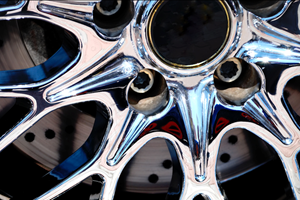Going Mobile in the Finishing World
Some think the future of automobiles is decreased demand. I recently sat through one presentation that was memorable for the revelation about which hardly anyone in the finishing industry is talking about.
I’ve sat through many presentations in my life. In fact, too many to remember even the slightest hint of what some of them were about. I’m pretty much a PowerPoint connoisseur these days.
But I recently sat through one presentation that was memorable for the startling revelation about which hardly anyone in the finishing industry is talking about these days—except maybe Kevin Braun, PPG’s vice president for industrial coatings in the Americas.
At the Ecoat18 conference in Tampa a few weeks back, he spoke of “Major Evolving Trends in the Coatings Industry and Their Impact on Future Coating Industry Needs.” That title alone should have told me something was in the air. The word “impact” doesn’t usually connote wonderful things. Think of a fist impacting a jaw or a meteorite impacting the earth. Neither of those are good thoughts.
The biggest takeaway from Braun’s excellent talk was that the world seems to be moving away from automobiles. Not exactly in that people are walking and biking more, but that people are starting to gravitate toward “renting” transportation by employing services such as Uber and Lyft.
As a younger generation with smartphones grows up and begins to move to new cities and buy homes or rent apartments, Braun says it will adapt in ways with which it is familiar, and that includes being without a car and yet mobile. Rideshare apps will transport them anywhere they want with the push of a button.
How did Braun reach this conclusion? Through extensive research performed by PPG and through the experience of his own daughter, who graduated from college and moved to a city where she opted to not get a car right away. Instead, she falls back on what she has done for years when she needs to get somewhere: call for a car.
“It is the way she and millions like her are living,” Braun says.
He estimates that, in the future, the world will need about 35 percent fewer cars than it is making right now. Individual ownership of vehicles will be a thing of the past, just like smoking in airplanes and restaurants. What we once took for acceptable behavior and practice changes over time.
The gas engine is also doomed, as we have all heard. Electric cars are the future, Braun promises. And he does so with a caveat: There are about 500 parts that need a protective coating in the typical car made today. In the future, that number of coated parts in battery-powered vehicles will also decrease significantly, maybe by 30 percent.
“That leaves a lot less parts to coat than we have now,” he says. And, remember, those parts will be on fewer cars, too. Do the math, and those finishers who rely on the automotive industry may be scrambling for other industries to service.
It isn’t just Braun and his PPG associates who believe this. A recent article in Forbes magazine suggests that automakers are also keenly aware that the demand for their products will decrease significantly in the next several decades.
“The horse is out of the barn now,” says Powell Kinney of Toyota Connected, who points the finger at car-sharing companies. “I don’t see things going back to individual ownership. I think we’re going to see maybe some fluctuation, but we’re not going to see a drive back towards everybody owning their own car.”
Ford’s John Kwant relayed to Forbes a situation similar to Braun’s with his own kids, ages 19 and 17.
“I polled them over the last three years, and I would say: ‘You get to keep one thing, what do you keep? Do you keep your driver’s license, or do you keep your smartphone?’” said Kwant, Ford’s vice president for City Solutions. “And the smartphone wins every time, because it’s a connection. If somebody needs a ride, they can do everything they need to do; the driver’s license is not what they need.”
Make no mistake: Cars are not going away tomorrow. (I, for one, like my car, my radio and driving with the windows rolled down.) The global car market is around $2 trillion, and that won’t disappear soon. But Morgan Stanley estimates the “personal transport market” of Uber, Lyft and whatever else comes down the pike to be at $10 trillion.
So what does all this mean for a finisher? I believe everyone in the industry learned a long time ago not to put all their eggs in one basket. When the car companies were bailed out almost a decade ago, everyone took a major hit, but they also learned the importance of diversification. Some shops avoided automotive entirely, while others scaled back their dependency and looked to other markets to get work.
We may be 20 to 30 years from what Braun, Kinney, Kwant and others are predicting, where owning an automobile may not be the necessity it once was. Things change quickly, however. We all switched from vinyl to eight-tracks to cassettes to CDs to streaming almost overnight—or so it seems. And now, my 24-year-old law student daughter spends some weekends scouring vintage vinyl record stores for the likes of Dylan, CSNY and the Beatles. Her collection stands at about 60 and counting. Talk about back to the future.
Related Content
A Chromium Plating Overview
An overview of decorative and hard chromium electroplating processes.
Read MoreInnovation in Plating on Plastic
Plating on advanced plastics solution offers improved adhesion, temperature resistance and cost savings.
Read MoreHow to Maximize Nickel Plating Performance
The advantages of boric acid-free nickel plating include allowing manufacturers who utilize nickel plating to keep up the ever-changing regulatory policies and support sustainability efforts.
Read MoreLiquid Chrome Vs. Chromic Acid Flake
Contemplating how to continue offering chromic acid services in an increasingly stringent regulatory world? Liquid chrome products may be the solution you’re looking for.
Read MoreRead Next
Education Bringing Cleaning to Machining
Debuting new speakers and cleaning technology content during this half-day workshop co-located with IMTS 2024.
Read MoreDelivering Increased Benefits to Greenhouse Films
Baystar's Borstar technology is helping customers deliver better, more reliable production methods to greenhouse agriculture.
Read MoreEpisode 45: An Interview with Chandler Mancuso, MacDermid Envio Solutions
Chandler Mancuso, technical director with MacDermid Envio discusses updating your wastewater treatment system and implementing materials recycling solutions to increase efficiencies, control costs and reduce environmental impact.
Read More





















